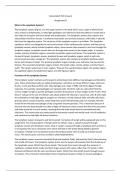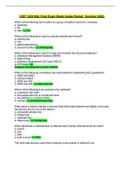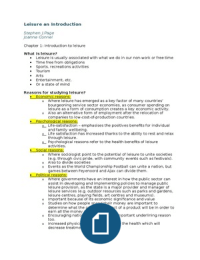Strategic supply chain management SSCM
Lecture 1
Why do we care about strategy theories?
Theories are relationships or laws that enable managers to predict and control their environment.
• A good suppliers fit allows supply chain practices that allow good outcomes
Generally speaking: theories are Laws
What do we mean by laws?
• Mechanisms
• Relationships between variables
• Success Factors
• Process models
• Contingency factors
• 2 x 2 matrices § Etc.
Matrix: If demand characteristics are predictable and lead
time is short we should use continuous replenishment.
Who?
What do we mean by organizations when talking about theories?
Many different types of relationships could be considered:
• Supply networks
• A supply chain
• A Dyad relationship (a buyer and a supplier)
• A Triad relationship (a buyer, supplier and customer)
• A Team (managers, board, employees)
• Production, manufacturing, service operation
• For profit, not-for profit, social enterprise
Where does SCM get theories?
Valuable, rare, non-imitable and non-substitutable resources are a
sourc4e of sustained competitive advantage.
,Transaction cost economics – buy or make question – CLASSIC THEORY
Firm boundaries (level of vertical integration) are explained by transaction costs (Williamson, 1985).
Transaction costs:
Governance costs associated with acquiring inputs for operating a business (cost of searching,
negotiating, bargaining, contacting, etc.)
Company should integrate activities into the company when outsourcing (external governance costs)
are larger than the costs of doing the activity in-house and using internal governance structure.
• Transactions high in uncertainty, frequency, and with transaction specific investments (IT
systems) are more efficient in-house.
• Small breweries are less likely to engage in Purchasing collaboratively due to fears of sharing
important information. However, they are open to do so in marketing activities.
Fisher’s theory of creating an appropriate SC based on product type
Functional products: Milk or canned tomatoes do not need a
responsive chain as margins are low so we need to save up on costs.
• They address a basic need and can have a relatively long
lead time
• It involves economies of scale, low cost transportation
Innovative products have very variable demands (jewelry,
technology).
• Because of the variable demand having too much of them
can kill our profits if they don’t get sold
• Here the retailers need flexible suppliers who can deliver
fast as they will be advise about demand at the last moment -> expensive
• For these products we need to have short lead times and responsive supply chains.
Mismatch? People buying big amounts of toilet papers and the company trying to refill fast.
Hau Lee’s extension
Focus here is more on supply and demand
uncertainty and the strategies to be used to tackle
this.
• High demand and supply uncertainty- Agile
supply chain is needed
,Conclusion- we covered
• The what’s and why’s of theory
• How management theories were adopted by supply chain people and adjusted
• Stand alone supply chain theories that have emerged from supply chain researchers and
practitioners
• Theories are constantly applied in new setting, tweaked, created and destroyed.
Integration theories
What are the strategies for integrating different tiers & performance?
Theories about supply chain tiers and their relationships (Multi tiers scm and Arcs of integration)
Supply chain complexity – How to manage it?
The trend towards outsourcing and global sourcing
has resulted in more complex supply chains
Our supplier has their own supplier and that
supplier has another supplier as well etc.
Multi-tier supply chain
The “Open MSC” represents a traditional supply
chain where information and product flows are
linear and there is no direct connection between
the buyer and the supplier’s supplier, giving the
supplier in the middle a mediating role
Example: raw material -> plant -> final customer (final customer doesn’t know what the farmer does)
The “Closed MSC” occurs when the buyer and the supplier’s supplier have established a formal link
and are directly connected to each other.
This means both firms have regular contact with
each other, share information and manage their
mutual relationship either formally (i.e., through
contracts) or informally through regular
interaction. In this case, the mediating role of
the supplier practically disappears
Example: the customer interacts with the supplier’s supplier
• Customer contacts the farmer to grow crops in a certain way
, The “Transitional MSC” is when the buyer and the supplier’s supplier stretch out to each other and
begin building a link and initiating a move toward a “Closed MSC.”
For instance, a buyer may insist on providing an
assurance or training function to the supplier’s
supplier if there is a need to guarantee products
are supplied to a particular standard.
Example: requiring the beer to have a bio
certificate so the customer offers training to the farmer.
Propositions
The supplier might have positional power as long as B and SS do not exchange information, so it
remains as the intermediary.
Finally, although the supplier’s supplier appeared, through its position at the end of the supply chain,
to have minimal power, it had access to natural and
technical resources, which might have been
essential for the success of the supply chain.
The Buyers of all three MSCs focused on product design and marketing, while the suppliers engaged
in manufacturing and trade.
Only the supplier’s supplier was handling the raw materials that are embedded in the final product.
The raw materials in an undifferentiated state would
have comparatively more sustainability and quality
implications. Further, once embedded, problems
become more difficult to detect.
As the MSCs become fully linked -> more transparency -> common goal is shared -> lower chances of
opportunism and adversarial behaviors -> relationships stability .
• However, this stability comes at a cost, mainly in
the form of management effort.
Importance of managing MSC
LG locked in cost savings before component prices rose saving several billion dollars
Lecture 1
Why do we care about strategy theories?
Theories are relationships or laws that enable managers to predict and control their environment.
• A good suppliers fit allows supply chain practices that allow good outcomes
Generally speaking: theories are Laws
What do we mean by laws?
• Mechanisms
• Relationships between variables
• Success Factors
• Process models
• Contingency factors
• 2 x 2 matrices § Etc.
Matrix: If demand characteristics are predictable and lead
time is short we should use continuous replenishment.
Who?
What do we mean by organizations when talking about theories?
Many different types of relationships could be considered:
• Supply networks
• A supply chain
• A Dyad relationship (a buyer and a supplier)
• A Triad relationship (a buyer, supplier and customer)
• A Team (managers, board, employees)
• Production, manufacturing, service operation
• For profit, not-for profit, social enterprise
Where does SCM get theories?
Valuable, rare, non-imitable and non-substitutable resources are a
sourc4e of sustained competitive advantage.
,Transaction cost economics – buy or make question – CLASSIC THEORY
Firm boundaries (level of vertical integration) are explained by transaction costs (Williamson, 1985).
Transaction costs:
Governance costs associated with acquiring inputs for operating a business (cost of searching,
negotiating, bargaining, contacting, etc.)
Company should integrate activities into the company when outsourcing (external governance costs)
are larger than the costs of doing the activity in-house and using internal governance structure.
• Transactions high in uncertainty, frequency, and with transaction specific investments (IT
systems) are more efficient in-house.
• Small breweries are less likely to engage in Purchasing collaboratively due to fears of sharing
important information. However, they are open to do so in marketing activities.
Fisher’s theory of creating an appropriate SC based on product type
Functional products: Milk or canned tomatoes do not need a
responsive chain as margins are low so we need to save up on costs.
• They address a basic need and can have a relatively long
lead time
• It involves economies of scale, low cost transportation
Innovative products have very variable demands (jewelry,
technology).
• Because of the variable demand having too much of them
can kill our profits if they don’t get sold
• Here the retailers need flexible suppliers who can deliver
fast as they will be advise about demand at the last moment -> expensive
• For these products we need to have short lead times and responsive supply chains.
Mismatch? People buying big amounts of toilet papers and the company trying to refill fast.
Hau Lee’s extension
Focus here is more on supply and demand
uncertainty and the strategies to be used to tackle
this.
• High demand and supply uncertainty- Agile
supply chain is needed
,Conclusion- we covered
• The what’s and why’s of theory
• How management theories were adopted by supply chain people and adjusted
• Stand alone supply chain theories that have emerged from supply chain researchers and
practitioners
• Theories are constantly applied in new setting, tweaked, created and destroyed.
Integration theories
What are the strategies for integrating different tiers & performance?
Theories about supply chain tiers and their relationships (Multi tiers scm and Arcs of integration)
Supply chain complexity – How to manage it?
The trend towards outsourcing and global sourcing
has resulted in more complex supply chains
Our supplier has their own supplier and that
supplier has another supplier as well etc.
Multi-tier supply chain
The “Open MSC” represents a traditional supply
chain where information and product flows are
linear and there is no direct connection between
the buyer and the supplier’s supplier, giving the
supplier in the middle a mediating role
Example: raw material -> plant -> final customer (final customer doesn’t know what the farmer does)
The “Closed MSC” occurs when the buyer and the supplier’s supplier have established a formal link
and are directly connected to each other.
This means both firms have regular contact with
each other, share information and manage their
mutual relationship either formally (i.e., through
contracts) or informally through regular
interaction. In this case, the mediating role of
the supplier practically disappears
Example: the customer interacts with the supplier’s supplier
• Customer contacts the farmer to grow crops in a certain way
, The “Transitional MSC” is when the buyer and the supplier’s supplier stretch out to each other and
begin building a link and initiating a move toward a “Closed MSC.”
For instance, a buyer may insist on providing an
assurance or training function to the supplier’s
supplier if there is a need to guarantee products
are supplied to a particular standard.
Example: requiring the beer to have a bio
certificate so the customer offers training to the farmer.
Propositions
The supplier might have positional power as long as B and SS do not exchange information, so it
remains as the intermediary.
Finally, although the supplier’s supplier appeared, through its position at the end of the supply chain,
to have minimal power, it had access to natural and
technical resources, which might have been
essential for the success of the supply chain.
The Buyers of all three MSCs focused on product design and marketing, while the suppliers engaged
in manufacturing and trade.
Only the supplier’s supplier was handling the raw materials that are embedded in the final product.
The raw materials in an undifferentiated state would
have comparatively more sustainability and quality
implications. Further, once embedded, problems
become more difficult to detect.
As the MSCs become fully linked -> more transparency -> common goal is shared -> lower chances of
opportunism and adversarial behaviors -> relationships stability .
• However, this stability comes at a cost, mainly in
the form of management effort.
Importance of managing MSC
LG locked in cost savings before component prices rose saving several billion dollars






